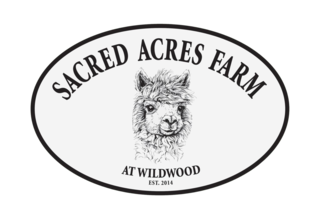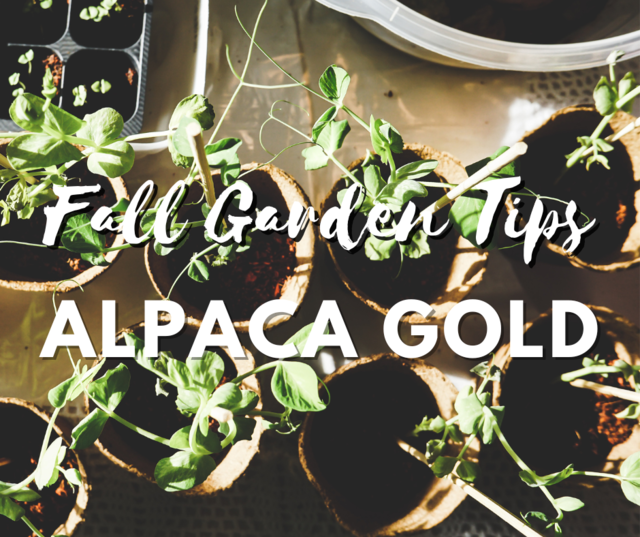Starting Your Fall Garden with Alpaca Gold
Wednesday, August 31, 2022
Hey Farm Friends,
Since we are closing out August, we want to remind everyone that this is the time to get our fall gardens planted. Typically in Virginia, our first frost dates range from mid to late October. So, in order to have our gardens ready to harvest before the frost, now is the time to get started. There is no place better to start than with soil.
What do alpacas have to do with gardening?
One of the best soil amendments on the market today is alpaca beans, also known as alpaca gold! With no added manufactured chemicals, it is considered a higher quality fertilizer than other barnyard animals. This is due to the nitrogen, phosphorus, and potassium levels in the beans. With N-P-K levels at 1.4-0.2-1.1, this is ideal for plants to develop strong roots, leaves, and flowers. The beans texturize the soil, enabling it to store the slow releasing nutrients and boosts water retention. As “cold manure,” you can add it directly to newly planted soil. It will not burn plants with direct contact and does not need to be “aged or cured” beforehand unless you are using it on edible plants and it is virtually odorless to humans. Making it an easy addition to your fall garden.
Composted alpaca manure can offer additional benefits to your garden as well as it can be mixed with other organic materials. Following the common habits of compost piles, it is best to alternate layers of browns (dry or woody plant material that adds bulk and assists air flow in your garden) and greens (manure, coffee grounds, and kitchen scraps that provide the nutrients to your soil). A helpful ratio for your compost pile is 4:1 browns (carbon) to greens (nitrogen). That being said, you may need to adjust this according to the needs of your particular garden. Being in Virginia especially, another benefit to alpaca fertilizer is that it is a natural deer repellent for your garden, as deer are adverse to the aroma.
How do I use alpaca gold in my garden?
As a cold manure, alpaca beans can be spread onto your garden plants and will not burn your plants with direct contact. For new plants, place the alpaca beans in the hold before planting. This will be the most beneficial and effective method for kick starting plant growth and root development. For seedlings, or to fertilize plants from the top-down, you can make an “alpaca tea.” If you are a gardener, you most likely have heard of something called compost-tea. This liquid fertilizer infusion not only feeds your plants but also helps keep plant diseases at bay by boosting the ratio of good to bad microbes through the additional oxygen from the water. Alpaca tea is made by mixing a ratio of ? alpaca beans with ? warm water, and allowing it to sit overnight. You can then stir this mixture and use it to water your plants! It is best to use the alpaca tea as soon as you can after brewing. After, you can make use again of these same beans you used to make the alpaca tea to compost or a soil mixture.
Happy gardening!
Since we are closing out August, we want to remind everyone that this is the time to get our fall gardens planted. Typically in Virginia, our first frost dates range from mid to late October. So, in order to have our gardens ready to harvest before the frost, now is the time to get started. There is no place better to start than with soil.
What do alpacas have to do with gardening?
One of the best soil amendments on the market today is alpaca beans, also known as alpaca gold! With no added manufactured chemicals, it is considered a higher quality fertilizer than other barnyard animals. This is due to the nitrogen, phosphorus, and potassium levels in the beans. With N-P-K levels at 1.4-0.2-1.1, this is ideal for plants to develop strong roots, leaves, and flowers. The beans texturize the soil, enabling it to store the slow releasing nutrients and boosts water retention. As “cold manure,” you can add it directly to newly planted soil. It will not burn plants with direct contact and does not need to be “aged or cured” beforehand unless you are using it on edible plants and it is virtually odorless to humans. Making it an easy addition to your fall garden.
Composted alpaca manure can offer additional benefits to your garden as well as it can be mixed with other organic materials. Following the common habits of compost piles, it is best to alternate layers of browns (dry or woody plant material that adds bulk and assists air flow in your garden) and greens (manure, coffee grounds, and kitchen scraps that provide the nutrients to your soil). A helpful ratio for your compost pile is 4:1 browns (carbon) to greens (nitrogen). That being said, you may need to adjust this according to the needs of your particular garden. Being in Virginia especially, another benefit to alpaca fertilizer is that it is a natural deer repellent for your garden, as deer are adverse to the aroma.
How do I use alpaca gold in my garden?
As a cold manure, alpaca beans can be spread onto your garden plants and will not burn your plants with direct contact. For new plants, place the alpaca beans in the hold before planting. This will be the most beneficial and effective method for kick starting plant growth and root development. For seedlings, or to fertilize plants from the top-down, you can make an “alpaca tea.” If you are a gardener, you most likely have heard of something called compost-tea. This liquid fertilizer infusion not only feeds your plants but also helps keep plant diseases at bay by boosting the ratio of good to bad microbes through the additional oxygen from the water. Alpaca tea is made by mixing a ratio of ? alpaca beans with ? warm water, and allowing it to sit overnight. You can then stir this mixture and use it to water your plants! It is best to use the alpaca tea as soon as you can after brewing. After, you can make use again of these same beans you used to make the alpaca tea to compost or a soil mixture.
Happy gardening!





